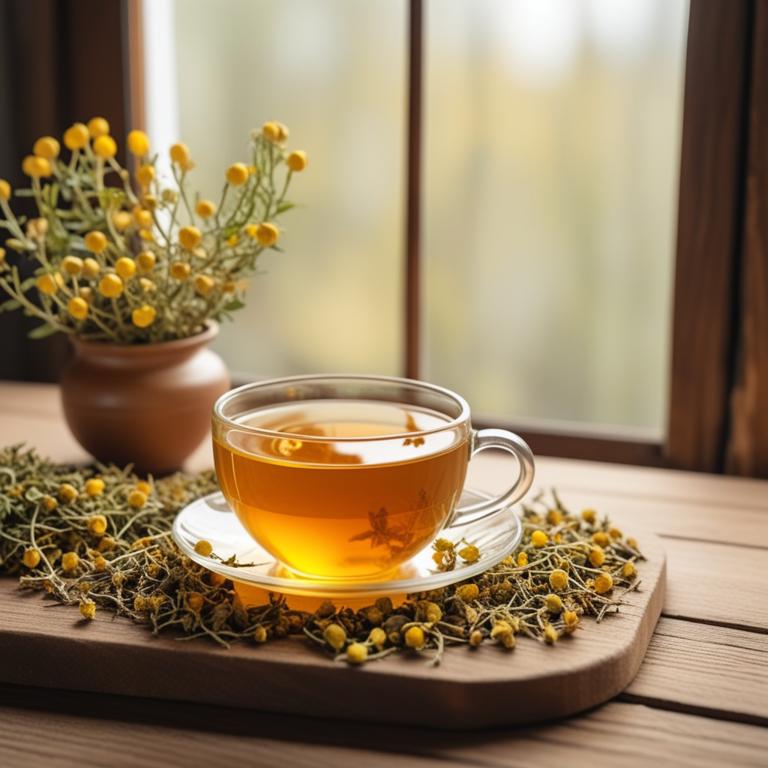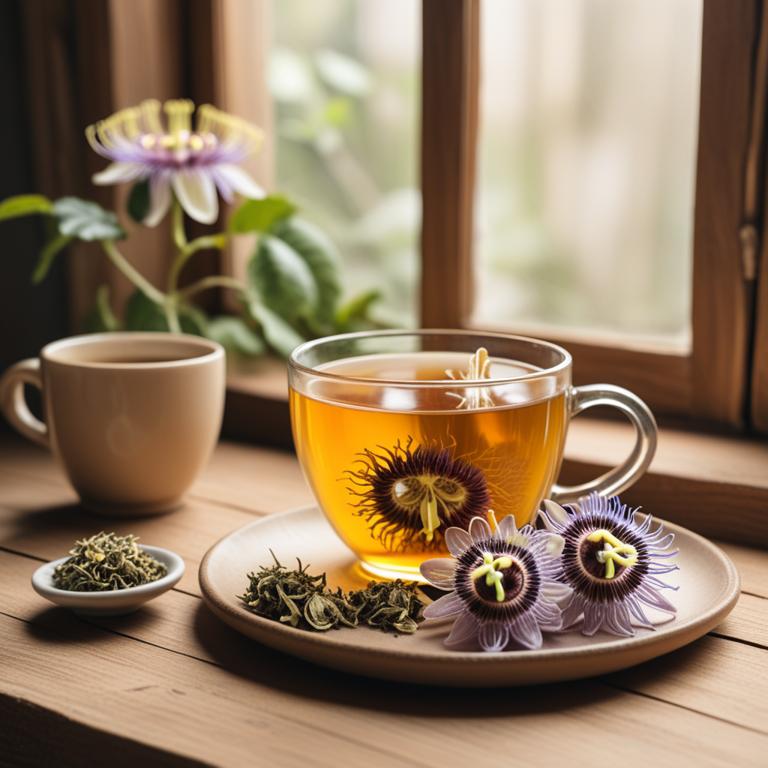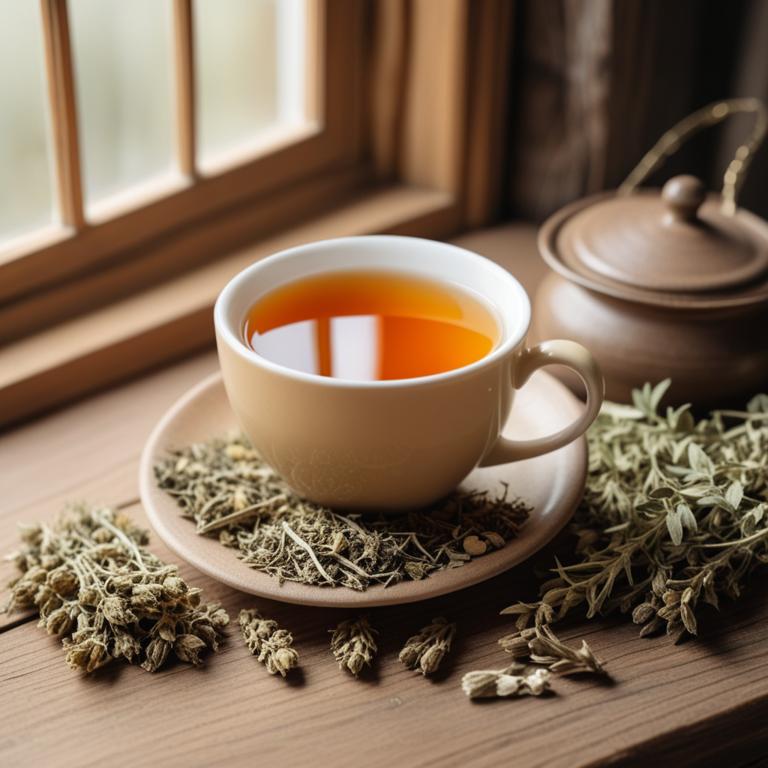13 Best Herbal Teas For Depression

Herbal teas for depression are a type of natural remedy that involves the consumption of teas made from various herbs to alleviate symptoms of depression.
These teas have been found to have numerous benefits, including reducing stress and anxiety, improving mood, and enhancing sleep quality.
Examples of herbal teas that can help treat depression include St. John's Wort, which contains hyperforin that can help regulate mood, passionflower tea, which helps to calm the nervous system, and lavender tea, which promotes relaxation and reduces anxiety.
Additionally, other herbal teas such as chamomile tea, peppermint tea, and ginseng tea have also been shown to have a positive effect on individuals suffering from depression due to their ability to reduce inflammation, improve cognitive function, and enhance overall well-being.
According to "Praxis", teas for depression may be a useful option, particularly for mild to moderate depression in young patients or those with a reserved attitude toward traditional medications.
Below there's a list of the 13 best herbal teas for depression.
- 1. Valeriana officinalis teas
- 2. Passiflora incarnata teas
- 3. Hypericum perforatum teas
- 4. Ginkgo biloba teas
- 5. Melissa officinalis teas
- 6. Lavandula angustifolia teas
- 7. Avena sativa teas
- 8. Silybum marianum teas
- 9. Withania somnifera teas
- 10. Panax ginseng teas
- 11. Curcuma longa teas
- 12. Zingiber officinale teas
- 13. Ocimum sanctum teas
Also you may be interested in...
TODAY'S FREE BOUNDLE
Herb Drying Checklist + Herbal Tea Shopping List + Medicinal Herbs Flashcards
Enter you best email address below to receive this bundle (3 product valued $19.95) for FREE + exclusive access to The Aphotecary Letter.
$19.95 -> $0.00
1. Valeriana officinalis teas

Valeriana officinalis teas, also known as valerian root tea, have been traditionally used to treat depression due to their calming and sedative properties.
The herbal preparation helps to treat this ailment by promoting relaxation, reducing anxiety and stress levels, and improving sleep quality, all of which are often associated with depression.
The bioactive constituents of valerian root tea, including valerenic acid, isovaleric acid, and valepotriates, contribute to its antidepressant effects by interacting with neurotransmitters and GABA receptors in the brain.
The benefits of valerian root tea in treating depression include reduced symptoms of anxiety and depression, improved mood, and enhanced overall well-being, making it a popular natural remedy for individuals suffering from this condition.
Related Study
According to "Molecules (Basel, Switzerland)", Valeriana officinalis teas have consistently been shown in clinical trials to relieve mild forms of depression, particularly in combination with other herbal products such as lavender, hops, maypop, and lemon balm.
2. Passiflora incarnata teas

Passiflora incarnata teas, also known as maypop tea, have been traditionally used to treat depression due to their adaptogenic and anxiolytic properties.
This herbal preparation helps to treat depression by reducing anxiety and stress levels, promoting relaxation and improving sleep quality, which are often associated with depression.
The bioactive constituents of Passiflora incarnata, including flavonoids, alkaloids, and glycosides, contribute to its antidepressant effects by modulating the activity of neurotransmitters such as serotonin and dopamine.
The benefits of Passiflora incarnata teas for treating depression include reduced symptoms of anxiety and depression, improved mood, and enhanced overall well-being.
Related Study
According to "Planta medica", Passiflora incarnata teas have been shown to have a beneficial effect on depression, as in silico analysis and subsequent pharmacological validation using the pentylenetetrazole kindling mouse model revealed that the majority of its phytoconstituents possess anticonvulsant, antidepressant, and nootropic activities.
3. Hypericum perforatum teas

Hypericum perforatum teas, also known as St. John's Wort, have been traditionally used to treat depression due to their anti-inflammatory and antioxidant properties.
The bioactive constituents of Hypericum perforatum, including hyperforin and hypericin, have been shown to have a regulatory effect on neurotransmitter levels, particularly serotonin and dopamine, which helps to alleviate symptoms of depression.
By increasing the production of neurotransmitters and promoting a balanced mood, Hypericum perforatum teas can help to reduce symptoms of depression and improve overall mental well-being.
The benefits of using Hypericum perforatum teas to treat depression include improved mood, reduced anxiety, and increased energy levels, making it a popular natural remedy for managing this common mental health condition.
Related Study
According to "European neuropsychopharmacology : the journal of the European College of Neuropsychopharmacology", Hypericum perforatum teas for depression show evidence of being superior to placebo in treating mild or moderate depression.
4. Ginkgo biloba teas

Ginkgo biloba teas have been traditionally used to treat depression due to their adaptogenic and neuroprotective properties, which help to regulate mood and reduce stress levels.
The bioactive constituents of Ginkgo biloba, including flavonoids, terpenoids, and bilobalide, play a crucial role in alleviating symptoms of depression by enhancing neurotransmitter activity and promoting antioxidant effects.
By reducing inflammation and improving blood flow to the brain, Ginkgo biloba teas help to alleviate symptoms of depression, such as anxiety, irritability, and mood swings.
The benefits of Ginkgo biloba teas in treating depression include improved mood, reduced symptoms of anxiety, and enhanced overall well-being, making them a popular natural remedy for this condition.
Related Study
According to "Pharmacopsychiatry", Ginkgo biloba teas for depression may improve sleep continuity and enhance Non-REM sleep due to a weakening of tonic CRH-activity, suggesting a potential new treatment strategy for the depressive syndrome with sleep disturbance.
5. Melissa officinalis teas

Melissa officinalis teas, also known as lemon balm teas, have been traditionally used to treat depression due to their calming and antidepressant properties.
The bioactive constituents of Melissa officinalis, including rosmarinic acid and linalool, help to reduce stress and anxiety levels, contributing to the alleviation of depression symptoms.
By promoting relaxation and improving sleep quality, Melissa officinalis teas can help individuals experiencing depression to better manage their emotions and find a sense of calm.
The benefits of using Melissa officinalis teas to treat depression include reduced symptoms of anxiety and depression, improved mood, and enhanced overall well-being.
Related Study
According to "BMC complementary medicine and therapies", Melissa officinalis teas showed efficacy in reducing depression and anxiety severity in patients with type 2 diabetes and depressive symptoms, with statistically significant differences in depression and anxiety scores compared to the control group after 12 weeks.
6. Lavandula angustifolia teas

Lavandula angustifolia teas, also known as English lavender tea, have been traditionally used to treat depression due to their calming and relaxing properties.
The bioactive constituents, including linalool, linalyl acetate, and lavandulol, help to reduce anxiety and stress levels by promoting a sense of calmness and tranquility.
By acting as a GABA receptor agonist, these compounds help to regulate the levels of neurotransmitters such as serotonin and dopamine, which play a crucial role in mood regulation.
The benefits of Lavandula angustifolia teas in treating depression include improved sleep quality, reduced anxiety and stress levels, and enhanced mood, making it a promising herbal remedy for individuals suffering from this condition.
Related Study
According to "Molecules (Basel, Switzerland)", Lavandula angustifolia teas may help alleviate symptoms of depression due to their antidepressant properties.
7. Avena sativa teas

Avena sativa teas, also known as oat straw tea, have been traditionally used to help alleviate symptoms of depression.
The soothing and calming properties of this herbal preparation help to reduce anxiety and promote relaxation, making it easier for individuals to cope with the emotional burden of depression.
Avena sativa teas contain bioactive constituents such as avenanthramides, avenacosides, and avenalumic acid, which have been shown to possess antioxidant and anti-inflammatory properties that contribute to its antidepressant effects.
The benefits of using Avena sativa teas to treat depression include reduced stress levels, improved mood, and enhanced overall well-being, making it a popular natural remedy for those seeking a holistic approach to mental health.
Related Study
According to "Biomedicine & pharmacotherapy = Biomedecine & pharmacotherapie", Avena sativa teas for depression have been found to have potential anti-depressant properties, with the phytochemical compounds in the plant, such as flavanoids and alkaloids, showing promise in treating various disease conditions.
8. Silybum marianum teas

Silybum marianum teas, also known as milk thistle tea, have been studied for their potential in treating depression due to their anti-inflammatory and antioxidant properties.
The bioactive constituents of Silybum marianum, such as silymarin, flavonoids, and alkaloids, may help to reduce symptoms of depression by modulating neurotransmitter activity and promoting neuroprotection.
Studies suggest that Silybum marianum teas may help to alleviate depression by reducing oxidative stress and inflammation in the brain, leading to improved mood and reduced symptoms of anxiety and depression.
The benefits of using Silybum marianum teas to treat depression include reduced risk of side effects compared to conventional antidepressants and potential improvements in overall mental health and well-being.
9. Withania somnifera teas

Withania somnifera teas have been traditionally used to treat depression due to their adaptogenic properties, which help to balance the body's response to stress and promote emotional well-being.
The bioactive constituents of Withania somnifera, including withanolides and alkaloids, are believed to contribute to its antidepressant effects by enhancing neurotransmitter activity and reducing inflammation in the brain.
Drinking Withania somnifera teas may help to alleviate symptoms of depression by promoting relaxation, improving sleep quality, and enhancing mood.
The benefits of using Withania somnifera teas to treat depression include reduced symptoms of anxiety and improved overall mental health, making it a potentially valuable natural remedy for individuals seeking a holistic approach to managing their condition.
Related Study
According to "Phytotherapy research : PTR", Withania somnifera teas for depression have some preliminary evidence of efficacy.
10. Panax ginseng teas

Panax ginseng teas have been studied for their potential to treat depression, and research suggests that their properties can help alleviate symptoms of this ailment.
The adaptogenic and antioxidant properties of Panax ginseng teas may help to reduce stress and anxiety, which are common contributors to depression.
The bioactive constituents of Panax ginseng, including ginsenosides and other flavonoids, are thought to play a role in modulating neurotransmitters and reducing inflammation, both of which are involved in the development of depression.
By promoting a sense of calm and well-being, Panax ginseng teas may help individuals with depression to manage their symptoms and improve their overall quality of life.
Related Study
According to "Nutrients", Panax ginseng teas for depression may be beneficial due to the standardized extract of Panax ginseng (G115) increasing brain-derived neurotrophic factor (BDNF) levels in the hippocampus and prefrontal cortex, which is associated with antidepressant activity.
11. Curcuma longa teas

Curcuma longa teas have gained attention for their potential in treating depression due to their unique properties that help alleviate symptoms of this ailment.
The bioactive constituents present in Curcuma longa teas, such as curcumin, flavonoids, and phenolic acids, have been found to possess antidepressant and anti-anxiety properties that help reduce symptoms of depression.
Curcuma longa teas may help treat depression by modulating neurotransmitters, reducing inflammation, and improving mood, thereby providing relief from symptoms of this condition.
The benefits of using Curcuma longa teas to treat depression include their natural origin, minimal side effects, and the ability to promote overall well-being, making them a potential alternative or complementary treatment option for individuals suffering from depression.
Related Study
According to "CNS & neurological disorders drug targets", Curcuma longa teas for depression contain potential compounds with antidepressant properties.
12. Zingiber officinale teas

Zingiber officinale teas, also known as ginger tea, have been traditionally used to treat depression due to its anti-inflammatory, antioxidant, and mood-enhancing properties.
The bioactive constituents of ginger tea, such as gingerols and shogaols, help to reduce inflammation in the brain and promote the production of neurotransmitters like serotonin and dopamine, which are often imbalanced in individuals with depression.
Drinking ginger tea regularly may help alleviate symptoms of depression by reducing anxiety and promoting relaxation, thereby improving overall mental well-being.
The benefits of using ginger tea to treat depression include its natural and non-invasive approach, making it a popular alternative to conventional treatments.
Related Study
According to "BioMed research international", Zingiber officinale teas for depression may be an alternative option for treatment in case conventional drugs are not applicable due to their side effects, low effectiveness, or inaccessibility.
13. Ocimum sanctum teas

Ocimum sanctum teas, also known as holy basil tea, have been traditionally used to treat depression due to their adaptogenic and anxiolytic properties.
This herbal preparation helps to treat depression by promoting relaxation, reducing stress levels, and enhancing mood, which ultimately leads to a decrease in symptoms of depression.
The bioactive constituents of Ocimum sanctum, including eugenol, rosmarinic acid, and ursolic acid, are responsible for its antidepressant effects, as they have been shown to have neuroprotective and antioxidant properties.
The benefits of Ocimum sanctum teas in treating depression include improved mood, reduced anxiety and stress, and enhanced cognitive function, making it a promising natural remedy for managing depressive symptoms.
Related Study
According to "BioMed research international", Ocimum sanctum teas, which are not specifically mentioned in the provided study, are not discussed, however, the study suggests that medicinal herbs like Ocimum sanctum may be used as a potential complementary method for treating depression, however, the efficacy and safety of these treatments for depression need to be supported by clinical studies.